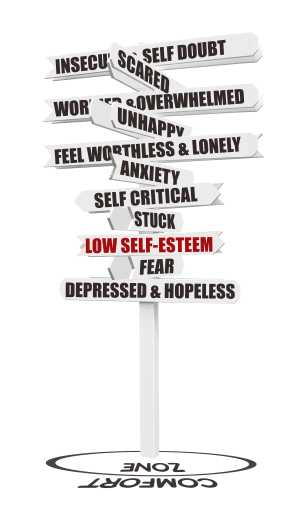Self-esteem and your genes
Raising low self-esteem
From time to time we all experience a lack of confidence and feel down in the dumps, but when you have low self-esteem constantly, and you notice that it’s a long-term issue, it’s time to start making a change in your life before it goes too far.
Self-esteem is simply how you view yourself, and when you have a healthy level of self-esteem, you have a positive outlook on life and feel good about what your future entails. Self-esteem also helps you to deal with the negative aspects of your life and to improve those too.
With low self-esteem, you look at yourself in a more negative light, and you are much more critical of yourself. You will also feel less capable of dealing with challenges that you encounter throughout your life.

How low self-esteem begins
Typically, you will find that low self-esteem starts among children. This is a result of the positive and negative messages which are conveyed by parents, siblings, friends, and even teachers. For whatever psychological reasoning, the negative messages about ourselves are the ones which stick in our brains and are the ones that we struggle to get out of our heads.
Sometimes low self-esteem can be due to having a difficult life, suffering from a health condition, or even because you feel as though you aren’t meeting the expectations that your parents and peers have set for you. Personality also factors into low self-esteem as some people are simply negative thinkers and others have high expectations of themselves.
Self-esteem and our genes
Our genes also contribute to having low self-esteem; particularly the COMT gene. If you have the “sensitive explorer” variant of this gene (which roughly 27% of the global population have), then you will tend to be a more creative individual with higher emotional reactivity. On the other hand, you may have the “warrior” variant of this gene (which around 46% of the population have), which is linked to a lack of sensitivity in situations which most would find to be stressful.
Lastly, you may have the third type of this gene which includes both variants which we mentioned above. The variant of this gene which you have significantly impacts how you deal with social interaction.
What contributes to low self-esteem and how to handle it
Eliminate negativity from your relationships
Having negative thoughts isn’t a bad thing unless they become overwhelming or your life focuses on them. Being able to share these negative thoughts with your friend isn’t a bad thing either, in fact, it’s encouraged – a problem shared is a problem halved.
However, if you are constantly negative or you have a friend who has a negative attitude, it may be time to spend less of your time around them. If that isn’t possible or they’re a close friend, try talking to them and helping them become a more positive person.
A healthy relationship should include someone who is positive, who appreciates you, and who you can confide in.
Don’t bully yourself
It’s okay to be critical of yourself, but there comes a time when too much is too much. Don’t bully yourself and instead, give yourself constructive criticism; be a compassionate person to yourself.
If you struggle to be a compassionate soul, consider how you would comfort your friend if they were to think how you were thinking – advising others is far easier than advising yourself.
Be assertive
Make sure that you respect other’s opinions as you would expect them to respect yours.
Don’t be afraid to say NO
When someone has low self-esteem, they feel that if someone asks them for something, they must respond with “Yes”, even if they don’t feel like that is the response that they want to give. Because of this, they feel more stressed and angry with themselves for not being able to say “No”. This can also lead to depression.
If you feel familiar with this problem and you need help, or you would like to find out more about your COMT gene variant, check out our DNA Stress test.


















